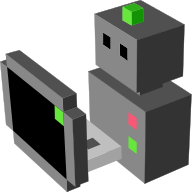Source code for morse.core.zone
import logging
logger = logging.getLogger("morse." + __name__)
from morse.core import mathutils
import morse.core.object
from sys import float_info
[docs]class Zone:
"""
Creates a named zone in the 3D environment. This can be used by
components via the :py:class:morse.core.ZoneManagerto trigger
specific behaviours when the component is inside the zone.
The main method is the contains one, which allow to decide if a
point is part of a zone (and so potentially to trigger some
behaviour).
Note that for simplicity, we currently assume the zone axis follows
the world axis.
"""
def __init__(self, obj):
self.name = obj.name
self.type = obj['Type']
self.obj = obj
mesh = obj.meshes[0]
# Get list of unique vertexes
vertexes_ = set()
for v_index in range(24):
vertex = mesh.getVertex(0, v_index)
vertexes_.add(vertex.getXYZ()[:])
vertexes = [mathutils.Vector(p) for p in vertexes_]
# Compute range
self._min_values = [float_info.max, float_info.max, float_info.max]
self._max_values = [-float_info.max, -float_info.max, -float_info.max]
for i in range(len(vertexes)):
for j in range(3):
# XXX Here, we assume there is no rotation
vertexes[i][j] = vertexes[i][j] * obj.worldScale[j] + obj.worldPosition[j]
if self._min_values[j] > vertexes[i][j]:
self._min_values[j] = vertexes[i][j]
if self._max_values[j] < vertexes[i][j]:
self._max_values[j] = vertexes[i][j]
[docs] def contains(self, pos):
"""
Verify if a pos (represented by a vector) is contained in the zone
The implementation assumes that the zone is a rectangle, with
axis following world axis.
"""
res = True
for i in range(3):
res = res and pos[i] >= self._min_values[i]
res = res and pos[i] <= self._max_values[i]
return res
[docs]class ZoneManager:
"""
Handle the different zones, allowing to search for them
'efficiently' (at least in an abstract way)
"""
def __init__(self):
self.all_zones = {}
self.zones_by_type = {}
[docs] def add(self, obj):
new_zone = Zone(obj)
logger.info("Adding zone %s of type %s" % (new_zone.name, new_zone.type))
self.all_zones[new_zone.name] = new_zone
zone_type = self.zones_by_type.get(new_zone.type, None)
if not zone_type:
self.zones_by_type[new_zone.type] = {}
zone_type = self.zones_by_type[new_zone.type]
zone_type[new_zone.name] = new_zone
def _get_subset(self, name = None, type = None):
search_list = self.all_zones
if name:
if name in self.all_zones:
search_list = {name: [self.all_zones[name]]}
else:
search_list = {}
if type:
if type in self.zones_by_type:
search_list = self.zones_by_type[type]
else:
search_list = {}
return search_list
[docs] def is_in(self, obj_or_pos, name = None, type = None):
"""
Determine if obj_or_pos is in a zone
If :param obj_or_pos: is a :py:class:morse.core.object.Object,
consider the position of the object. Otherwise, assume it is a
position.
If a :param name: is precised, check only if this specific zone
contains the position
If a :param type: is precised, only search in the zone of this
type.
"""
pos = obj_or_pos
if (isinstance(obj_or_pos, morse.core.object.Object)):
pos = obj_or_pos.position_3d.translation
search_list = self._get_subset(name, type)
for zone in search_list.values():
if zone.contains(pos):
return True
return False
[docs] def contains(self, obj_or_pos, name = None, type = None):
"""
Determine which zone(s) contain(s) the position pos
If :param obj_or_pos: is a :py:class:morse.core.object.Object,
consider the position of the object. Otherwise, assume it is a
position.
If a :param name: is precised, check only if this specific zone
contains the position
If a :param type: is precised, only search in the zone of this
type.
The method returns the list of zones containing the position,
considering the previous limitation
"""
pos = obj_or_pos
if (isinstance(obj_or_pos, morse.core.object.Object)):
pos = obj_or_pos.position_3d.translation
search_list = self._get_subset(name, type)
res = []
for zone in search_list.values():
if zone.contains(pos):
res.append(zone)
return res
